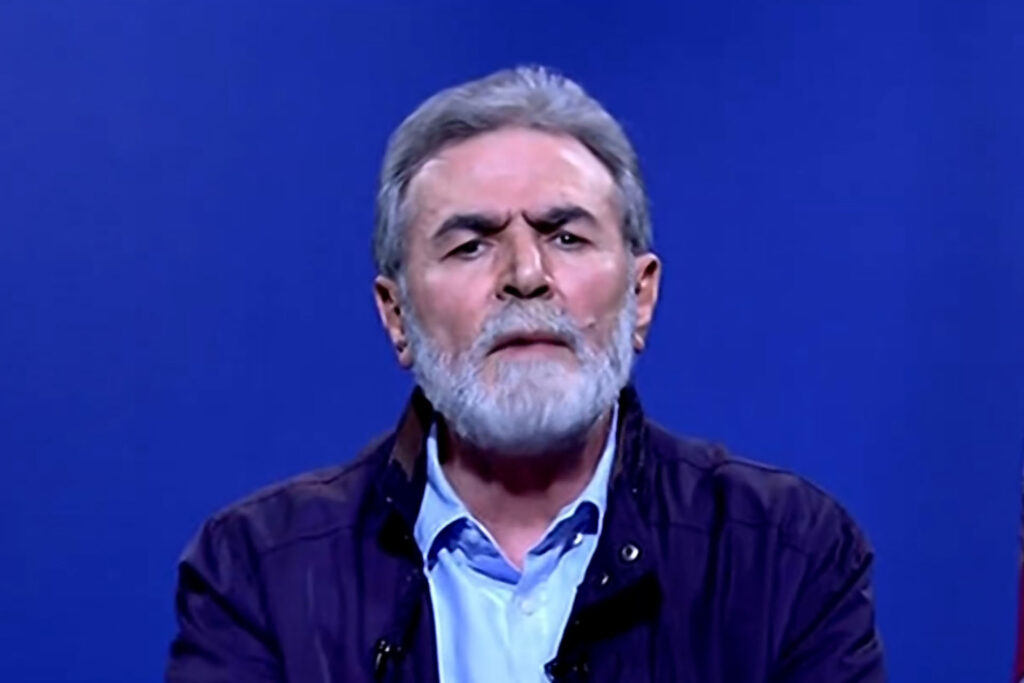Ziad Al-Nakhalah is a Palestinian politician. He assumed the position of Secretary-General of the Islamic Jihad Movement in Palestine in 2018, succeeding the late Ramadan Abdullah Shallah in the first internal elections held by the movement. He is considered one of the influential figures in the Islamic Jihad Movement’s Arab and Islamic relations.
In the 1980s, he founded the military wing of the movement, which he called the “Mujahid Islamic Forces,” and in 2000, after the Al-Aqsa Intifada, it transformed into the “Jerusalem Brigades.”
In 2014, the US State Department included his name on the “terrorism” list under the pretext of his support for anti-Israel movements and organizations and the delivery of weapons to Gaza. The United States set a $5 million reward for anyone who provides information about him or helps in his arrest.
Birth and upbringing
Ziad Al-Nakhalah was born on April 6, 1953 in the city of Khan Yunis, south of the Gaza Strip. His father, Rushdi Al-Nakhalah, was martyred in 1956 during the tripartite aggression against Egypt. He is married and the father of two sons and four daughters.
Study and training
He received his primary education in the city of Khan Yunis, from where he moved to the Orphans Institute to complete his studies, then to Gaza schools, where he completed his studies in the middle and secondary levels. He joined the Teachers Institute in Gaza and obtained a certificate of proficiency in teaching.
Political career
Ziad al-Nakhalah’s political career is divided into two periods. The first period began with his joining the Arab Liberation Forces led by Ziad al-Husseini (1943-1971), and ended with his arrest on May 29, 1971 and his sentencing to life imprisonment on charges of throwing bombs at Israeli patrols.
In prison, Al-Nakhalah lived a new experience, as he devoted himself to reading Sayyid Qutb’s books, including the book “In the Shadows of the Qur’an,” and interacted with the Islamic movement that began to form inside the prisons after the Islamists realized that the rest of the other movements were participating in the resistance work.
He spent 14 years in several Israeli prisons, before he was liberated in an exchange deal in 1985 known as the Galilee deal. Al-Nakhalah supervised the prisoner exchange process while he was in captivity.
The second period of his political career began the day after his release in 1985, when he was chosen as a member of the movement’s first Shura Council, led by the late Dr. Fathi Al-Shaqaqi. The Shura Council during that period represented the movement’s leadership.
He was chosen as a member of the Supreme Leadership Authority of the Jihad Movement, and was assigned to establish the movement’s first military wing between 1985 and 1986.
During the Stone Intifada in 1987, Al-Nakhalah emerged as a leader and an active member in it. He then moved on to participate in the leadership body of the uprising, and represented the movement in the unified Palestinian national leadership, which was formed at that time from a number of political forces.
During the period of detention of Secretary-General Dr. Fathi Al-Shaqaqi, Ziad Al-Nakhalah took charge of the movement committee in the Gaza Strip.
On April 12, 1988, he was arrested by Israeli forces on the grounds of contributing to fueling the intifada and participating in the founding of the Islamic Jihad Movement. He was sentenced to exile to southern Lebanon along with dozens of activists and leaders from the Jihad Movement and the Islamic Resistance Movement (Hamas), with the aim of keeping him away from the arenas of confrontation with the Zionist occupation.
On October 26, 1995, the Israeli intelligence service (Mossad) assassinated the founder of the Jihad movement, Fathi al-Shaqaqi, in Malta. Ramadan Shallah was chosen to lead the movement, while Ziad al-Nakhalah was chosen as his deputy, and he was again entrusted with the task of arranging the conditions of the movement’s military wing.
During the Israeli aggression on the Gaza Strip in 2014, while Al-Nakhalah was a member of the factions’ and forces’ discussions to reach a ceasefire agreement, Israeli warplanes targeted his family’s home in the city, killing his brother’s wife and her son.
Al-Nakhalah headed the Islamic Jihad movement’s delegation to the Palestinian reconciliation talks on several occasions due to his important relations with various Palestinian parties. He participated with Shallah in bridging viewpoints and bringing together President Mahmoud Abbas and the former head of the political bureau of Hamas, Khaled Meshal, more than once after the division and division that had occurred. witnessed by the Palestinian political arena.
On December 24, 2023, Al-Nakhalah headed a delegation from the Islamic Jihad movement to Egypt to discuss the situation in the Gaza Strip regarding the aggression that Israel launched against the Strip on October 9, 2023, and continued for months.
His political vision
Ziad Al-Nakhalah believes that the Islamic Jihad movement has a clear vision on the issue of the Palestinian-Israeli conflict, different from the rest of the other resistance factions, as it considers Israel a Western project in the region in which the Jews were used to implement it.
He believes that the movement’s distinctive point lies in its understanding that “the Zionist project is built on the basis of the complete abolition of the Palestinian people,” and that the forces of revolution and resistance must re-read this project and prepare the tools to confront it.
He also believes that the Palestinians have lost their compass in the midst of their conflict with Israel, and have begun to put forward initiatives for a solution as if they were the ones who created the problem, considering that the dialogue between the Palestinian factions is a waste of time, and that reconciliation will not occur without the approval of Israel, which controls geography, security, and the economy.


